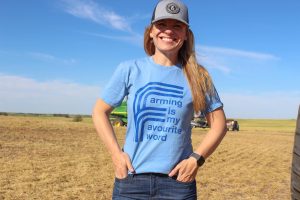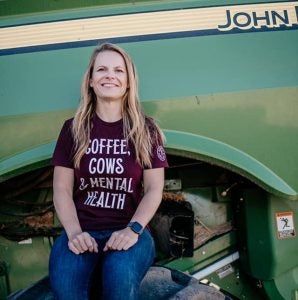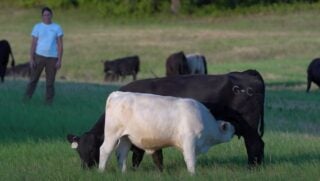In agriculture, mental health advocate Lesley Kelly notes: “It’s OK to not be OK”
Agriculture is a stressful field, no matter the year, but 2020 has certainly exacerbated those feeling. Many point to three main stressors in this industry: finances, workload, and unpredictability, according to Lesley Kelly, who blogs under the name @highheelsandcanolafields, is a farmer in Saskatchewan, Canada, and co-founded The Do More Agriculture Foundation. “Throw in a pandemic along with the everyday stressors, and it can be a lot,” said Kelly.
The most important part of facing hard times is taking care of yourself. Self-care can have a negative connotation and tends to conjure up the idea of bubble baths and yoga — and while those can be effective, there’s so more to it.
“Knowing yourself and knowing your boundaries is important,” said Kelly. “It’s important to know how to prioritize yours needs while also trying to farm.”
Kelly explained that self-care looks different for herself, her husband, and her brother, and that is perfectly OK. They discovered their self-care by trial and error, and it can vary by the season. Self-care for their family can be as simple as breathing exercises in the tractor, humor, journaling, or photography.
Another important part is taking in the small joys of life explains Kelly — a family supper, being with friends, watching a movie together, or going for a family walk.

It can be difficult to adjust to practicing self-care, but it really can be simple things that allow you to take a second to rest and relax, such as an extra long, hot shower during harvest or, simply, a five-minute break.
“Just know it’s OK for you to also be a priority,” said Kelly. “The farm is a priority, but so are you.”
Self-care is important because you cannot pour from an empty cup. To be able to take care of others and the farm well, you have to take care of yourself. The Kellys refer to it as keeping their slip tank full — because without that, fueling or servicing other vehicles is impossible.
“Self-care is productive,” said Kelly. “It’s OK to not be OK. It’s OK to feel. It’s OK to have hard days. It’s OK to have slow days. All of that is OK because you’re doing what you need to do to be OK.”
Discussing farmer mental health
The Do More Agriculture Foundation has resources that can help people discover self-care options for them. It also helps facilitate discussions surrounding mental health.
Mental health needs to be discussed — struggles, wins, hardships, successes. They all need to be discussed to help address the perceptions that surround mental health overall, but especially in agriculture.
“The most important resource to take advantage of for mental health is each other,” said Kelly. “No one knows what a farmer goes through better than another farmer. Lean on each other.”
This is easier said than done, because it can be hard to open up. She explained that whenever we see a burning combine we run and help, but discussing our hardships and challenges can be tough because our neighbors are also our competitors.
Having a group of supportive people to discuss hardships with is key in maintaining mental health.
“It can be a group on social media, it can be other farmers, it can be family or friends from a different town, or. other parents,” said Kelly. “It doesn’t matter as long as it is supportive.”
If someone you know is struggling there are a few key things to remember. First, there are two types of support that can be provided: emotional and practical. Emotional is listening, providing empathy and reassurance, while practical is providing advice, information or problem solving. Knowing which type of support the person is looking for is important.
“These conversations are hard, awkward and uncomfortable, but I would rather have them than not,” said Kelly.
Recognizing the need
What are the signs that someone is struggling and could use support? Kelly said she always looks to see if people are outside their normal or their routine — like if they are not eating or sleeping, or are showing up late to the farm. “We know our family and friend’s normal, so it can be easy to spot the changes,” said Kelly. “Sometimes before they even notice.”
Once a change is noticed, offering support is important; saying and showing that you care about the person. Tell them that you are there if they ever need to talk. Kelly said they might not reach out right then, but it will help the dialogue begin.

Offering support is great, but sometimes your loved one needs to or chooses to reach out to a professional. Kelly said it is critical to not take that personally and be grateful that they reached out to someone who can provide them with resources, tools, and tips to help them survive the hard time.
She also explained that sometimes people do not know what they need. Her advice is to ask to help with something specific — getting groceries, making doctors appointments, or picking up the kids.
“I ask if there is anything that is weighing them down today,” said Kelly. “Anything that’s a huge stress that you might not be able to get done.” Offering help with specific items can really take a weight off of someone while showing that you care and are there for them.
Agriculture is a tough field all the time, but especially so with COVID-19. Be sure that you are taking care of yourself and reaching out to those close to you. “Remember, it’s OK to not be OK. It’s ok to not know what tomorrow brings,” said Kelly. “It’s our first global pandemic. We’ll figure it out day by day with the support of each other.”
Michelle Bufkin is a freelance communication specialist whose goal is to help producers bridge the farm-to-plate knowledge gap that exists with consumers today. She uses her full-time position as the Membership and Communication Director at the Arkansas Cattlemen’s Association to interact with producers and work on building that connection.



